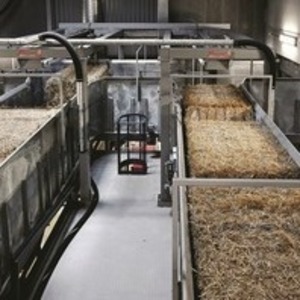Renewable diesel project to use Inbicon's demonstration facility

Photo: DONG Energy
March 5, 2014
BY DONG Energy
DONG Energy and Neste Oil have entered into a collaboration to develop a cost-effective technology for producing renewable diesel and aviation fuel from agricultural residues.
Neste Oil, one of the world’s largest producers of renewable fuels, has joined forces with DONG Energy in Northern Europe, to develop an integrated process to produce renewable diesel and aviation fuel based on agricultural residues.
“We are continuously developing our Inbicon technology in order to expand the use of agricultural residues,” said Henrik Maimann, vice president at DONG Energy. “We are now able to produce high-quality cellulosic sugars that can be used in various applications, and we see Neste Oil as the obvious partner when developing a technology where we use these cellulosic sugars for renewable fuel production.”
Advertisement
Advertisement
"Neste Oil is currently the world's only biofuel producer capable of producing premium-quality renewable fuel on an industrial scale from more than 10 different feedstocks,” said Lars Peter Lindfors, Neste Oil's senior vice president, technology. “Increasing the use of waste- and residue-based feedstocks is one of our most important goals, and microbial oil produced from forest industry and agricultural residues, such as straw, is one of our potential future feedstocks.”
"Our cooperation with DONG Energy is a continuation of Neste Oil’s ongoing microbial oil research, and joint technology development will support our efforts aimed at developing technology capable of producing microbial oil on an industrial scale," Lindfors continued.
DONG Energy’s Inbicon technology will be used in the first part of the process to pretreat biomass and produce cellulosic sugars that can be converted into microbial oil with Neste Oil's technology. Microbial oil can be used as a feedstock for fuels such as renewable diesel and renewable aviation fuel.
Advertisement
Advertisement
Neste Oil and Dong Energy have already passed the laboratory and pilot phase, and the technologies must now be optimized and verified on a larger scale. DONG Energy will use Inbicon’s demonstration facility in Kalundborg, Denmark, to optimize the yield and performance of the biomass pretreatment to perfectly match Neste Oil's microbial oil process. Neste Oil has been running a microbial oil pilot plant in Porvoo, Finland, since 2012.
“With this collaboration we have a partner for the further development of our technology, and at the same time Neste Oil is able to develop their own technology by using our product,” Maimann said.
“DONG Energy’s technology is promising and we believe that joint technology development is the best way to find a cost-effective solution for producing renewable fuels from agricultural residues,” said Lindfors.
Both parties will receive funding from the ERA-Net Plus BESTF program in connection with the collaboration.
Related Stories
The USDA significantly increased its estimate for 2025-’26 soybean oil use in biofuel production in its latest World Agricultural Supply and Demand Estimates report, released July 11. The outlook for soybean production was revised down.
The U.S. Energy Information Administration maintained its forecast for 2025 and 2026 biodiesel, renewable diesel and sustainable aviation fuel (SAF) production in its latest Short-Term Energy Outlook, released July 8.
XCF Global Inc. on July 10 shared its strategic plan to invest close to $1 billion in developing a network of SAF production facilities, expanding its U.S. footprint, and advancing its international growth strategy.
U.S. fuel ethanol capacity fell slightly in April, while biodiesel and renewable diesel capacity held steady, according to data released by the U.S. EIA on June 30. Feedstock consumption was down when compared to the previous month.
XCF Global Inc. on July 8 provided a production update on its flagship New Rise Reno facility, underscoring that the plant has successfully produced SAF, renewable diesel, and renewable naphtha during its initial ramp-up.
Upcoming Events










